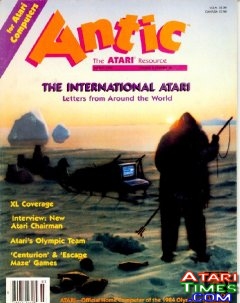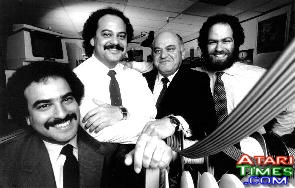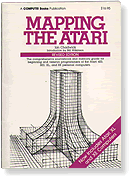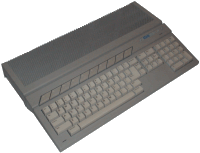 |
 |
Mapping Ian Chadwick |
I've been able to trace your career back to a March, 1984 issue of Antic magazine. Did you start your professional writing career with Antic?
 No. Actually I started writing for the Ottawa Citizen in 1969, fresh from university, doing music reviews (on the side - I was a copy boy at the time - think of Jimmy Olsen...). I did a little miscellaneous writing after that until computers entered my life (1977). Then I started learning to program and writing about computers and software. I got some pieces published in Softside back around 1978-79. Around that time I was also doing a lot of freelance work, writing press releases, technical manuals, that sort of thing.
No. Actually I started writing for the Ottawa Citizen in 1969, fresh from university, doing music reviews (on the side - I was a copy boy at the time - think of Jimmy Olsen...). I did a little miscellaneous writing after that until computers entered my life (1977). Then I started learning to program and writing about computers and software. I got some pieces published in Softside back around 1978-79. Around that time I was also doing a lot of freelance work, writing press releases, technical manuals, that sort of thing.
I was also writing reviews of wargames and about military history for Moves and Strategy and Tactics in the late 1970s and early 80s. I was given a column in Moves to review computer games in 1979 (as far as I know the first regular computer game column in print) and continued it until they were sold around 1984-5
In the mid-80s, I was editor of Canada's first computer magazine, InfoAge. I was editor of Microcomputer News and then Computers in the Classroom after that. I've been a reporter, too, and was managing editor of the local newspaper in Collingwood for three years. I'm still writing about computers for a Canadian paper, and I also write for some odds and ends - pieces for the motorcycle press, some opinion and political pieces, animal and animal behaviour, even some travel items (Mexico). Mostly I write online on my website, however. I design and manage a few small web sites for clients as well.
Your articles for Antic covered an amazing array of topics, from programming in logo to game reviews. What is your most fondly-remembered article for the 8-bits?
 Heck. I can hardly remember what I had for breakfast and you want me to remember old columns? Let's see? Probably my review of
Tetris. I had a lot of fun writing it from the perspective of a Soviet intelligence officer. I usually tried to have some fun with my columns, make them easy to read and provide a bit of humour. I did enjoy writing and learning about Logo too - and revived that interest only recently when I discovered
Starlog online. I loved the reviewing because each column was an excuse to learn, to explore and to grow.
Heck. I can hardly remember what I had for breakfast and you want me to remember old columns? Let's see? Probably my review of
Tetris. I had a lot of fun writing it from the perspective of a Soviet intelligence officer. I usually tried to have some fun with my columns, make them easy to read and provide a bit of humour. I did enjoy writing and learning about Logo too - and revived that interest only recently when I discovered
Starlog online. I loved the reviewing because each column was an excuse to learn, to explore and to grow.
How much did Antic pay you for the average article?
Gee... not a lot, I recall. I don't remember the exact amount, but $15 or $25 each, I think. That's US, of course, which translates roughly into $143,206 Canadian...;-) It was more a work of love than for financial reward. I helped me get other work as a writer, however. I did a lot of documentation writing behind the scenes - many of Antic's software manuals, as well as several from Batteries Included and other companies, were written by me. They paid better than the columns, but they weren't as much fun! I spent a lot more buying hardware and software to review than the reviews ever paid me!
Did you ever get perks, such as free products, for being an Antic writer?
Sometimes. Getting review copies is always like pulling teeth. Some publishers are good about, others just don't care. It's still true today. Hardware was even tougher. I can't recall ever getting any hardware for free. I was able to buy a few items at cost, but no one ever gave hardware away, at least nothing major. Being in Canada made it even harder to convince publishers I was legitimate. Sometimes I was able to wrestle a few programs from a publisher at the end of a CE show. I think the biggest perk was just being in the frontline, writing and working with computers and being able to tell people I reviewed games for a living. It was an exciting, fun time.
What was the strangest item you remember seeing for the 8-bits at the time?
I think it was the development of the Forth language for computers. Talk about an impractical, clumsy and convoluted language! I spent hours trying to learn it and eventually gave up when my head started to smoke. But it was amusing to try and think in reverse Polish notation. We were all searching for a good, competent language for development back then - this was before C came along. Forth was one of those entertaining eddies in the current. It was a time of very inventive, creative and crazy people. A lot of products and programs were being developed that today would seem strange.
You were a regular contributor to Antic for many years. What is your most interesting memory working for the magazine?
 Going to San Francisco to meet Jim, Gary and the crew was like a pilgrimage to the heart of the Atari scene. Getting to know some of the developers and programmers was also really great. I remember working with Russ Wetmore on several of his projects. Russ and I got invited to one of Infocom's big bashes in Las Vegas, at the Presley mansion. They held a murder mystery theatre/party for several thousand guests. What a hoot! Russ and I actually paid attention and won prizes for solving the mystery. Champagne flavoured tooth paste was mine. I met Douglas Adams at that party too. At another Infocom party in the Chicago Aquarium, I met Timothy Leary and got an autographed book from him. Boy they had great parties. And great games too! Who can forget Hitchhiker's Guide to the Galaxy?
Going to San Francisco to meet Jim, Gary and the crew was like a pilgrimage to the heart of the Atari scene. Getting to know some of the developers and programmers was also really great. I remember working with Russ Wetmore on several of his projects. Russ and I got invited to one of Infocom's big bashes in Las Vegas, at the Presley mansion. They held a murder mystery theatre/party for several thousand guests. What a hoot! Russ and I actually paid attention and won prizes for solving the mystery. Champagne flavoured tooth paste was mine. I met Douglas Adams at that party too. At another Infocom party in the Chicago Aquarium, I met Timothy Leary and got an autographed book from him. Boy they had great parties. And great games too! Who can forget Hitchhiker's Guide to the Galaxy?
What did the writers at Antic really think about the Tramiels when they acquired Atari in 1984?
 Mostly that the Philistines had taken the throne. The Tramiels were powerhouse sales people, but they didn't seem to share our passion, our unquestioning loyalty and dedication to the products. Nor did they seem to have the same affection for their users and customers. They had come from owning and running an aggressive company - Commodore - the serious competition for Atari, so we wondered if they really cared as much about the product as much as about the sales figures. This really came out with the ST. They seemed disinterested in the actual machine, and in my opinion gave grudging support to developers at the time, support that might have helped produce more products and customers for the ST. It became difficult to impossible to even get information on new products from them, let alone borrow them for reviews. We also wondered about product development - Atari seemed to lag behind in new products when ownership changed.
Mostly that the Philistines had taken the throne. The Tramiels were powerhouse sales people, but they didn't seem to share our passion, our unquestioning loyalty and dedication to the products. Nor did they seem to have the same affection for their users and customers. They had come from owning and running an aggressive company - Commodore - the serious competition for Atari, so we wondered if they really cared as much about the product as much as about the sales figures. This really came out with the ST. They seemed disinterested in the actual machine, and in my opinion gave grudging support to developers at the time, support that might have helped produce more products and customers for the ST. It became difficult to impossible to even get information on new products from them, let alone borrow them for reviews. We also wondered about product development - Atari seemed to lag behind in new products when ownership changed.
Did you ever meet the staff writers for Antic, or were all of your articles sent in remotely from your home in Ontario?
I traveled to San Francisco a couple of times and visited the office. Had dinner with Gary Yost. I met a couple of others at a Compuserve conference in Ohio. I did chat back an forth with several people on the phone and on Compuserve. We were scattered all over the continent, so it was never easy to meet except at conferences and shows.
Did you ever attempt to send in your articles via modem?
Very often. When Compuserve and Delphi were developed, it was easier to put articles in their file space for the magazines to download. My first modem was about the size of a toaster oven, had a cradle for a telephone headset, and an array of switches you had to set. It ran at a blistering 300 baud, with alternate setting of 110, in case the other person wasn't as fast! So sending articles by modem, long distance, was pretty amazing technology, as long as you could get the modems to talk to one another. Sometimes it took a few tries to get them talking. Once Hayes came on the scene and brought out its 1200 baud modem, things improved a lot (and my long distance phone bills diminished!).
Did you write your articles on an Atari? What software did you use?
 Yes, I wrote almost everything on my beloved 800. I used several programs, including Atariwriter and later a word processor from Batteries Included (Paperclip I think it was called). I used numerous programs, but all had some severe limitations on file size. I still have all my original disks for Mapping - about a dozen or so of them - in the basement. Of course, I have nothing that can read them these days. Nostalgia is why I keep them.
Yes, I wrote almost everything on my beloved 800. I used several programs, including Atariwriter and later a word processor from Batteries Included (Paperclip I think it was called). I used numerous programs, but all had some severe limitations on file size. I still have all my original disks for Mapping - about a dozen or so of them - in the basement. Of course, I have nothing that can read them these days. Nostalgia is why I keep them.
If I remember correctly, you were also a member of TAF (the Toronto Atari Federation) for several years. What was TAF like when you were a member?
A collection of passionate geeks. Great group, lots of passion, mostly young males. I was never a significant member because I'm not really a group dynamic person. More solo. There were a lot of wild and crazy - but very intelligent - people in TAF. I was always amazed at how much energy and effort they put into their machines.
TAF now really exists only as a club logo; it's few remaining members no longer meet at regular intervals. Do you think that users' groups still serve a useful purpose, or have their functions been usurped by chat rooms and internet web-sites?
Essentially yes. Which is unfortunate because while the Net serves a significant purpose in expanding communication worldwide. But it also tends to estrange and distance people through the impersonal nature of its communication mode (typing). There are group dynamics that happen, synergies that develop, when people meet. This doesn't happen online. Also, the voices of 60-100 people in one room are louder than 10,000 comments in any chat room. User groups could influence publishers, where forums and chat rooms have lesser impact. Also, user groups are focal points, where the Net is diffuse. Whose site is "official" or even recognized? I doubt manufacturers and publishers seriously examine every fan site or forum for trends and comments. Only a few ever get attention. But user groups brought people together in a geographical area and it was easier and more convenient to send a rep to them to listen and learn than it is to check out every related Web site today. And user groups merged into regular conferences and conventions that had a large impact and influence on the industry in those days.
TAF has an enormous wealth in its software libraries and in the knowledge of its various users. Have you ever thought about writing a history of the club, or of Canadian computing in general? The Tramiels did, as you know, start up Commodore in Toronto in the 1950s.
Time, dammit, time. Who has it? It needs time to do research, interviews, etc. And then - who would buy it? It's a labour of love and could be a lot of fun - but... I'm still trying to write the Great Canadian Novel, a task that's taken the past 20 years. Maybe when I retire... if I retire... I'll have to time!
I note that you always did try to emphasize the "Canadian" Atari connection whenever you could. Did you have any ties with Atari Canada?
For a while I had a good relationship with Atari Canada, but it was informal. The computer manager was Dave (Langman?). He was really helpful in keeping me informed and getting me new hardware to test or to keep me up to date on new products. He was able to get source code and the developer manuals for me, too. He was a great guy who really cared about the Atari. After he left, I worked with the Tramiels' people, but they didn't have the same passion for the product, more for the marketing.
I always tried to give Canadians better coverage because - aside from national pride - they really didn't have anyone else to present them. Very few Canadians were writing for US computer magazines. I continue to emphasize Canadians in my columns today, by the way.
Atari Corp. was often criticized by Atari enthusiasts. What did you think of the crew at Atari Canada?
Like I said, it started off well with people who really cared, even if they were never terribly well organized or very good at marketing. After the Tramiels took over, it changed to a more sales-driven organization, but lost the personal warmth of the early days. I don't think Canadian computer companies or distributors ever really understood either their customers or the importance of user groups. There was a similar lack of response from Apple to its users. Radio Shack (my first computer was a TRS 80) set up classes to teach new users and helped develop local user groups at first, but they soon gave up too. Atari wasn't worse than others, but they could have embraced us more affectionately. On the plus side, Atari published all of its source codes and developers' manuals - so anyone could buy them. Not every company was that open.
You might remember R.O.M., which was a Canadian Atari magazine that had a very brief existence in the early '80s. Did you ever contribute anything
to it?
Frankly, I don't recall. I might have. I was asked to contribute to a lot of small publications and I usually did - for free because few if any had money for writers! I really enjoy writing and I still contribute to many publications, still writing for free in many cases.
You're often cited now in Atari references for being the author of "Mapping the Atari" for "Compute!" books. Are you surprised that this book has remained a seminal reference for 8-bit enthusiasts nearly two decades after it was first published?
Well, it's a reference work first and foremost. I don't think anything at the time or since has been quite as comprehensive. I was a bit obsessive about trying to make sure it provided everything in the machine. I'm glad people can still use it.
How did you get it published?
 I wrote the original draft of the book in a three-week no-sleep marathon. I had been laid off my job, had no prospects, very little money, and was obsessed with computers, so instead of hunting for new work, I spent my time at the computer and drinking lots of coffee. I read everything I could find on the Atari and 6502 coding, from source code to magazine articles, to books and technical pamphlets.
I wrote the original draft of the book in a three-week no-sleep marathon. I had been laid off my job, had no prospects, very little money, and was obsessed with computers, so instead of hunting for new work, I spent my time at the computer and drinking lots of coffee. I read everything I could find on the Atari and 6502 coding, from source code to magazine articles, to books and technical pamphlets.
I was originally going to submit it as an article to the magazines, but it kept growing as I found out more and more. Then my former boss and friend Michael Reichman (later an executive at Batteries Included) convinced me to publish it with him. He was working on a statistics package for the Atari (I wrote the manual for it) and we decided we would create a company, Irata Press, to publish it and other products.
Well, the book kept growing and our money didn't match the costs of printing. So we submitted it to Compute! Books in the fall of 1983 and they accepted it. We kept it as a joint venture under Irata because we intended to use the royalties to finance a software publishing company. Although I did all the work, we split the royalties so we could build a company. Sadly, it never happened and I never got anything back from Michael for my efforts.
You can see Irata in the copyright of the first edition. I had worked in book publishing and made sure we kept the copyright, rather than giving it to Compute! However, relations grew strained when Michael and I worked together for a new company developing desktop publishing software (a disaster which later folded). So I took back the copyright for the second edition in 1985. That's why I was able to let it be published online - it's still my copyright.
Do you ever refer to it yourself?
Today? Mostly from nostalgia, but back then I used us several copies, thumbing them into pieces. No one could remember all that data! Mostly I look at it and am amazed that at some point in my life I had the drive (and time) to finish something that large. Theses days it takes me a month to get around to changing a light bulb!
I'm glad to see that Mapping the Atari is listed on your website (www.ianchadwick.com), but don't you think it deserves its own web page given its high historical influence and general fabulousness?
I have allowed it to be turned into HTML code and put online at http://www.atariarchives.org/mapping/ for anyone who wants to use it. I did this for free and only ask that no one sells it. I like to think that, if there is still a community of potential users, they will be able to use it now. Putting up my own pages would not necessarily add to what they have already done. Of course, it could use some HTML cross references, some indexing, that sort of thing.
Did it really sell 60,000 copies, or are you just teasing us?
No, that's actually correct. A few more than that, I believe. The first edition sold the most. Although the second edition has more content, it came at the time when Atari and eight bits were waning. It was also poorly laid out - the original material was used unchanged with the new stuff tacked onto the end. All of the updates and corrections were put in as appendices because the publisher didn't want to spend the money to re-plate the book. A bit clumsy, I thought.
So it really did make you rich and famous!
Famous in a small sense, perhaps, but hardly rich unless you're measuring in the scale of, say, the average dirt farmer in a developing nation. As I said, in the first edition, I split the original royalties in order to have some money to finance a software firm that never materialized. I never saw any of that money later and never got anything back from the company Irata Press.
And what I got in my portion had to help carry me through a period of unemployment. Eventually, the royalties from the second edition gave me enough that, with everything else we owned and some money borrowed from family, my wife and I were able to put a down payment on a small house. Such are the riches of publishing! For a brief while, I ran a small BBS from my apartment in Toronto (on my 800) - the royalties giving me just enough to rent a second phone line! But when I moved, the BBS died and I never restarted it.
I note that you also did write for ST-Log, but I haven't been able to find any contributions to Antic's sister publication, Start. Is this just an omission on my part?
 No. At the time, The Antic people wanted a new group to work for them and I was 8-bit - old fashioned. They actually contracted for me to publish a "Mapping the ST" and got me an early model ST to work on, but it never materialized partly because they went in other directions and I simply didn't have the time or drive to do the extensive work on the ST as I had on the 800. They were vastly different machines and the entire "mapping" concept wasn't really suited for the ST. The people at STart - Clayton Walnum for one - were able to lure me away with offers of a regular column for the ST when they realized I was available.
No. At the time, The Antic people wanted a new group to work for them and I was 8-bit - old fashioned. They actually contracted for me to publish a "Mapping the ST" and got me an early model ST to work on, but it never materialized partly because they went in other directions and I simply didn't have the time or drive to do the extensive work on the ST as I had on the 800. They were vastly different machines and the entire "mapping" concept wasn't really suited for the ST. The people at STart - Clayton Walnum for one - were able to lure me away with offers of a regular column for the ST when they realized I was available.
Were you ever heavily "into" the ST line? What was your computer collection like?
At one point, I had an Atari 400, 800, TRS 80, Apple II, Commodore 64, Kaypro, Pet, ST and a few others (even a Mac and a PC later on). My workroom looked like a NASA launch site! I really did like the ST and worked a lot on it (writing for STart and contributing to the forums on Compuserve and Delphi). But it wasn't the same. The GEM OS made it a lot more difficult and demanding for hackers and tinkerers like myself. With the 8-bits you could play away in BASIC all day and develop programs. When the ST came along, you needed something heftier and more serious - C (and before it Pascal). BASIC was a fun language to learn and work in. C is as much fun as reading Karl Marx. But you needed something that could compile and send calls through to GEM efficiently. I think the user base became more passive with GUI packages because it was harder to play with and learn. We became more application oriented, less machine-oriented and the programming falls into the hands of professionals. Same thing happened with PCs when they grew up from DOS to Windows. This is a trend in most technology. It happened with motorcycles and automobiles, it happened with radio.
Did you write for any other home computing magazines after the Atari magazine market died in North America?
Not consistently. I continued to write about computer games and wargames for Strategy & Tactics for a few years. I did more technical work - writing and editing manuals, documenting code on mainframes, that sort of thing. I did some freelance work for newspapers too.
The Atari community now exists largely in a few remaining users' groups in the United States and Europe, and on the internet. Many current Atari users grew up on books such as Mapping the Atari and reading Antic and Analog, and we can't get it out of our systems. Do you think that Atari clubs have a future on the internet, or are they just doomed to die a slow death?
It's really a nostalgic thing now. It could last a long time - there are groups that still maintain 19th century steam engines today! The Internet may help keep the groups alive. But the practical use for the Atari has long since been surpassed by newer computers. And very few people today will read a technical manual like Mapping. Back then everyone had a library of books and everyone tinkered. It was more fun, so people bought books they wouldn't glance at today.
I've looked at the many interesting articles that you've posted on your web page; none of them are, however, dedicated to computers. Have you truly finished writing about computers in the home?
No, I write a weekly column for a Belleville newspaper about computers. I am thinking about putting some of my columns online on my site too. Computer reviews are ubiquitous online. I've tried to focus on some interests a bit less common.
Almost all of the "big" computing magazines like Compute!, Creative Computing, and the magazines dedicated to home computing on individual systems have now disappeared, and the remaining periodicals no longer have type-in programs. Do you think that we lost an essential part of home computing when magazines stopped encouraging users to code programs themselves?
Computers changed when the IBM PC arrived. Basically they evolved from home to office machines. And owners went from tinkerers to users .Along with that came some powerful but difficult languages like C and the PC assembly code. It's like car engines today: the electronic components prevent most owners from doing more than minor maintenance. But it wasn't very long ago that a large number of drivers did their own engine work. Computers and operating systems have become so complex that they require specialists. Yes, a lot of the sense of discovery has been lost, but on the other hand we've developed some amazing software in the process.
Even though you're retired from the world of Atari publishing, you still use your 800 and AtariWriter Plus to write, don't you?
Well.... sad to say, I don't even have an Atari any more. I'd love to have one again, but my beloved machine was damaged during a move around 1990 and was reduced to a collection of plastic shards and broken circuit boards. I was heartbroken. And by then it was about impossible to find a replacement. I'm not sure what I'd do with it - maybe play some games, but I wish I still had one sitting on my desk to remind me of those days. Today I use a cobbled-together PC and WordPerfect, among other programs. But in my heart, I'm still using my 800!
| Name: | |
| Subject: | |
| Comment: | |
| Check: | What is the greatest video game company of all time? (Hint: Atari.) |